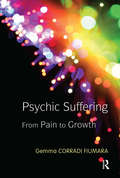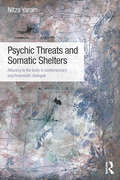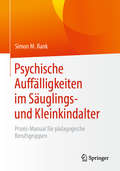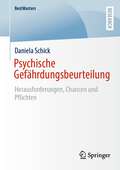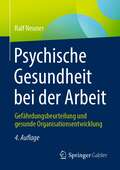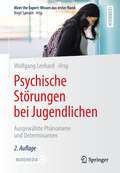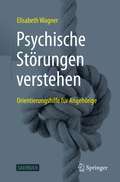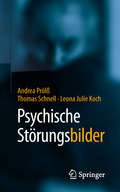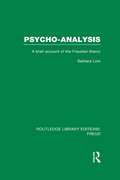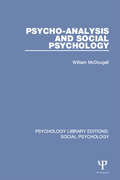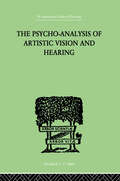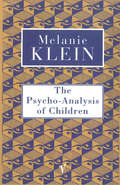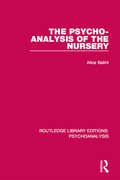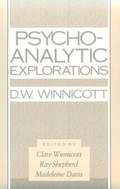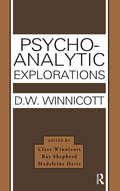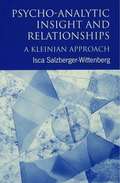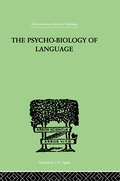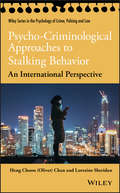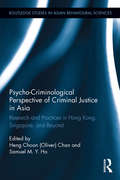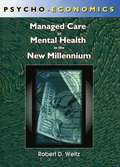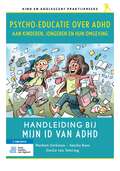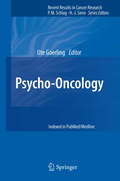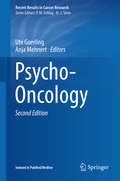- Table View
- List View
Psychic Suffering: From Pain to Growth
by Gemma Corradi FiumaraThis book creates an awareness of our 'excessive' fear of mental pain: the ubiquitous abhorrence of inner distress functions as a gravitational force that may ultimately impede both maturation and creativity, as if we were facing a choice between utilising our inner suffering, or else being overwhelmed by our fear of its inertial power. Psychoanalytic interpretation is the effort to render pain more approachable, and bearable enough for us to move forward, to avoid the escapes of pathology and somatisation. This exploration is in fact an urgent concern, both clinically and socially. At the centre of psychoanalytic culture, and of the humanities in general, the question of inner pain propels us to refocus research on the psychic transition towards agency, as contrasted to acquiescing in an outlook of passivity and recourse to innumerable anaesthetics. We believe that in psychoanalysis we can gain a microscopic view of inner phenomena and also a back-stage perspective of our vicissitudes.
Psychic Threats and Somatic Shelters: Attuning to the body in contemporary psychoanalytic dialogue
by Nitza YaromThere is increasing recognition within psychoanalysis and related therapies that awareness of the body is important in understanding and treating patients. Psychic Threats and Somatic Shelters explores the ways in which adults and children become acquainted with the range of physical issues that arise within their psychoanalytic or psychological treatments. Nitza Yarom discusses in a practical and clinically focused way the large variety of physical outlets which today’s person uses to shelter from the many troubles and restrictions that are placed on everyday life. Her book is divided into two main sections: Somatic shelters, which explores the variety of physical symptoms encountered by patients, including problems with weight and eating; with sensation through sight, sound, smell and taste; in movement through hyper activity or rigidity and through the communication of physical pain. Embodied dialogue, in which the author updates the use of the basic technical principles of psychoanalysis to involve the body in the treatment including transference and counter-transference between analyst and patient. In Psychic Threats and Somatic Shelters the emotional communication of these body narratives are vividly demonstrated in the treatments presented, here the interaction in the consulting room is revealed in bodily resonance and its therapeutic effects. This book is written for psychoanalysts and psychotherapists, psychologists, body therapists, family therapists, social workers and art/movement therapists.
Psychische Auffälligkeiten im Säuglings- und Kleinkindalter: Praxis-Manual für pädagogische Berufsgruppen
by Simon M. RankDieses Praxis-Manual leistet Hilfestellung, psychische Auffälligkeiten im Säuglings- und Kleinkindalter im pädagogischen Alltag von Reifungsphänomenen zu unterscheiden, die eigenen pädagogischen Handlungs- und Beratungsmöglichkeiten zu erkennen, weiteren Hilfebedarf einzuschätzen, diesen gut zu kommunizieren und manifesten Störungen vorzubeugen. Es versteht sich als Handbuch mit wichtigen Schwerpunkten für die Praxis, in dem auch kurzfristig nachgeschlagen werden kann. Es richtet sich in erster Linie an Personen, die Säuglinge und Kleinkinder betreuen, kann jedoch auch für behandelnde Berufsgruppen und interessierte Laien hilfreich sein.Ihr Wegweiser für den pädagogischen Alltag, der Sie einlädt, Ihr Wissen anzuwenden.
Psychische Erkrankungen als gesellschaftliche Aufgabe: Interdisziplinäre Perspektiven auf aktuelle Herausforderungen (Schriften zu Gesundheit und Gesellschaft - Studies on Health and Society #5)
by Pauline Mantell Carolin Schwegler Christiane WoopenPsychische Erkrankungen sind eine gesamtgesellschaftliche Herausforderung mit vielen Facetten und müssen als solche auch interdisziplinär betrachtet werden. Der vorliegende Sammelband setzt genau hier an und hat das Ziel, ein differenziertes Bild über die Bedeutung psychischer Erkrankungen und den gesellschaftlichen Umgang mit ihnen zu zeichnen. Die vielfältigen Fragen, die sich dabei stellen, werden durch Vertreter*innen aus den Gesundheits-, Sozial- und Geisteswissenschaften erörtert. Dies beinhaltet theoretische sowie praktische Perspektiven mit historischen, aktuellen und zukunftsperspektivischen Schwerpunkten, die sich insgesamt dem Ziel widmen, aktuelle Herausforderungen aufzuzeigen und einen Beitrag zur Verbesserung der psychischen Gesundheitsversorgung in den Bereichen der Krankheitsbehandlung, Prävention und Gesundheitsförderung zu leisten.
Psychische Gefährdungsbeurteilung: Herausforderungen, Chancen und Pflichten (BestMasters)
by Daniela SchickIm aktuellen Diskurs erhöhter Krankenstände durch psychische Belastung und Beanspruchung am Arbeitsplatz bietet dieses Buch eine umfangreiche theoretische und praktische Handlungsempfehlung bei der Einführung psychischer Gefährdungsbeurteilungen in Organisationen. Zusammenfassend wird zum Ausdruck gebracht, dass die Implementation der psychischen Gefährdungsbeurteilung auf den Ebenen Individuum, Team, Führungskräfte und Organisation ein bisher wenig genutztes, jedoch durchaus zukunftsorientiertes und nachhaltiges Potenzial für alle Organisationsmitglieder beinhaltet. Es veranschaulicht, welche konkreten Herausforderungen, Widerstände und Handlungsfelder allein durch die Bezugnahme auf die Gefährdungsbeurteilung innerhalb einer Organisation herausgearbeitet werden können. Das Buch nimmt übersichtlich und detailliert die Perspektiven des Arbeitsrechts, der Betriebswirtschaft, des Gesundheitsmanagements und der Organisationsentwicklung ein. Es steht somit als wichtiger Beitrag und ganzheitliche Orientierungshilfe für eine erfolgreiche und nachhaltige Mitarbeiterbindung sowie ein gesundes Unternehmen.
Psychische Gesundheit bei der Arbeit: Gefährdungsbeurteilung und gesunde Organisationsentwicklung
by Ralf NeunerDas Buch schlägt die Brücke zwischen Theorie und Praxis. Es klärt die wichtigsten Begriffe rund um das Thema psychische Belastung und geht auf die bestehenden gesetzlichen Verpflichtungen und Aufgabenverteilung ein. Kommentare zu Normen und relevante Gesetze wurden aktualisiert. Die vierte, umfassend überarbeitete und erweiterte Auflage beleuchtet Arbeitskonzepte, die unter den Begriff New Work fallen.Im Hauptteil werden Methoden und Verfahren zur Messung und Dokumentation von psychischen Belastungen erläutert. Dazu hat der Autor einen Darstellungs- und Kriterienkatalog erarbeitet, mit dem sich der Leser die spezifischen Vor- und Nachteile einschlägigen Verfahren zur Ermittlung psychischer Belastung erschließen kann. Die Ergebnisse der Analyse sind Handlungsgrundlage für die gesunde Organisationsentwicklung. Anhand zahlreicher Praxisbeispiele werden Maßnahmen und deren Nutzen zur Verbesserung der Qualität der Arbeitsgestaltung für die Beschäftigten und das Unternehmen aufgezeigt.Das Buch wendet sich an alle Interessierten, die wissen möchten, wie man psychische Belastung bei der Arbeit effektiv erfassen und in der Folge verringern kann. Dazu gehören Fachkräfte für Arbeitssicherheit genauso wie Arbeitsmediziner, Betriebsräte, Personalverantwortlich und alle, deren Anliegen die Verbesserung der Qualität der Arbeitsbedingungen ist.
Psychische Störungen bei Jugendlichen: Ausgewählte Phänomene und Determinanten (Meet the Expert: Wissen aus erster Hand)
by Wolfgang LenhardVerfolgt man die mediale Berichterstattung, so verdichtet sich schnell der Eindruck, dass die Bedingungen, unter denen Jugendliche aufwachsen, fortlaufend ungünstiger werden. Ziel dieses Buches ist es, diese Hypothesen einem Realitätscheck zu unterziehen und sie auf ihren Wahrheitsgehalt zu überprüfen:Machen digitale Medien einsam und aggressiv, wann werden Jugendliche zu Gewalttätern und nehmen psychische Störungen wie ADHS immer mehr zu? Ist Rauschtrinken unter Jugendlichen tatsächlich ein immer ernster werdendes Problem und welchen Einfluss haben sexuelle und aggressive Medieninhalte auf die Entwicklung Jugendlicher? Welche Entwicklungen sind tatsächlich ungünstig oder sogar gefährlich, welche Aussagen sind nicht haltbar und an welcher Stelle haben sich Bedingungen sogar verbessert? Zu Wort kommen Expertinnen und Experten aus den Bereichen Psychologie, Psychiatrie, und Soziologie, die ihre Forschungsergebnisse im Interview-Stil klar, unterhaltsam und verständlich auf den Punkt bringen und gesellschaftliche Herausforderungen aufzeigen. Nicht nur lehrreich für Masterstudierende, sondern besonders geeignet für Professionals aus Bildung und Erziehung, Psychologie, Psychiatrie, Pädagogik, sowie für alle an dieser Thematik Interessierten.
Psychische Störungen verstehen: Orientierungshilfe für Angehörige
by Elisabeth WagnerDieses Sachbuch hilft Angehörigen und anderen Nahestehenden, psychische Störungen besser zu verstehen. Die häufigsten Krankheitsbilder werden beschrieben, Entstehungsbedingungen verständlich dargestellt. Es informiert über adäquate Behandlungsansätze und Beratungsangebote, vermittelt einen Überblick über die Wirkung von Psychopharmaka und Psychotherapie bei den einzelnen Störungen. Alle, die rund um Betroffene beteiligt sind, werden dabei unterstützt, einen möglichst konstruktiven Umgang mit den auftretenden Belastungen und die richtige Balance zwischen Unterstützung und Abgrenzung zu finden. Zum Kontext: 25 % der Menschen in Westeuropa erleiden einmal in ihrem Leben eine behandlungsbedürftige psychische Störung. Daher ist davon auszugehen, dass jeder Mensch in seinem nahen Umfeld zumindest mit einem/einer psychisch Kranken zu tun hat. Viele fragen sich: Wie kann ich diese Krankheit/Störung verstehen? Wie ist die Prognose? Wie soll ich mit dem/der Betroffenen umgehen? Wie kann ich helfen? Wer kann helfen? Wann sind Psychopharmaka nötig und wie gefährlich sind sie wirklich? Dieses Buch gibt Antworten. Über die Autorin: Dr. Elisabeth Wagner, Fachärztin für Psychiatrie und Psychotherapeutische Medizin, Lehrtherapeutin für systemische Familientherapie, betreut viele Betroffene, aber auch deren soziales Umfeld. Dieses zu unterstützen, ist ihr ein Anliegen.
Psychische StörungsBILDER
by Andrea Prölß Thomas Schnell Leona Julie KochDieses Buch widmet sich den vielfältigen psychischen Störungen und wendet sich an alle Interessierte, von Betroffenen und Angehörigen bis zu therapeutisch und pflegend tätigem Fachpersonal. Im Mittelpunkt steht eine künstlerische Annäherung an die einzelnen psychischen Störungen, indem jede Diagnose mittels einer schwarz-weiß skizzierten Darstellung interpretiert wird. Ergänzt werden die bildlichen Darstellungen durch jeweils kurze und prägnante Beschreibungen. Diese stellen die wichtigsten Symptome der Störungsbilder vor, Informationen zur Häufigkeit ihres Auftretens, Kenntnisse über mögliche Entstehungsbedingungen, ihren Verlauf, sowie therapeutische Optionen und einen prognostischen Ausblick. Während teils erhebliche Fehlinformationen über psychiatrische Störungsbilder kursieren, enthält dieses Werk ausschließlich Informationen, die nach heutigem Wissensstand allgemein anerkannt sind. So ist es bestens geeignet für Betroffene und Angehörige. Psychiatrische oder wissenschaftliche Vorkenntnisse sind zum Verständnis nicht erforderlich. Die Autoren habe eine leicht verständliche Sprache gewählt, sodass das Werk für jeden Interessierten eine ebenso originelle, wie interessante und bereichernde Reise in die Welt der psychiatrischen Phänomene bietet.
Psycho-Academic Holocaust: The Special Education and ADHD Wars Against Black Boys
by Umar JohnsonPsycho-Academic Holocaust has been written for laypersons with everyday language, and should be read by all adults who care about the future of young Black males in America, England, Canada and the Caribbean. An entire chapter has been dedicated to teaching parents and teachers how to eliminate challenging and disruptive behaviors without medication.
Psycho-Analysis: A Brief Account of the Freudian Theory (Routledge Library Editions: Freud)
by Barbara LowOriginally published in 1920, this book was intended as a brief outline of psychoanalysis for those interested in the subject, but without the time to study the work of Freud and his followers first hand.
Psycho-Analysis and Social Psychology (Psychology Library Editions: Social Psychology)
by William McDougallFrom the Preface: ‘In these few lectures delivered in the University of London (May 1935) I have returned to the always interesting, but generally quite futile, task of criticizing the teachings of Professor Sigmund Freud and his school. On the present occasion my criticisms are made with ruthless frankness, in accordance with the policy I have recently adopted. I have realized too late that I might have done more for my chosen science, had I from the first spoken with a less modest voice.’ Originally published in 1936, two years before the author’s death, this title is a critique of the teachings of Freud and his school from a social psychology standpoint. It has several appendices which include the examining of ‘Totem and Taboo’ and the Oedipus complex.
The Psycho-Analysis Of Artistic Vision And Hearing: An Introduction to a Theory of Unconscious Perception (International Library Of Psychology Ser. #Vol. 38)
by Ehrenzweig, AntonThis book deals with the inarticulate form elements hidden in the unconscious structure of a work of art or—what comes to the same thing — with the unconscious structure of the perception processes by which we actively create or passively enjoy these unconscious form elements. In order to become aware of inarticulate forms we have to adopt a mental attitude not dissimilar to that which the psycho-analyst must adopt when dealing with unconscious material, namely some kind of diffuse attention.
The Psycho-Analysis of Children: The Conduct Of The Psycho-analysis Of Children As Seen In The Treatment Of A Ten Year Old Boy
by Melanie KleinThe Psycho-Analysis of Children, first published in 1932, is a classic in its subject, and revolutionised child analysis. Melanie Klein had already proved, by the special technique she devised, that she was a pioneer in that branch of analysis. She made possible the extension of psycho-analysis to the field of early childhood, and in this way not only made the treatment of young children possible but also threw new light on psychological development in childhood and on the roots of adult neuroses and psychoses.
The Psycho-Analysis of the Nursery: Analysis Of The Nursery (Routledge Library Editions: Psychoanalysis)
by Alice BalintOriginally published in English in 1953, this title was first printed in Hungarian in 1931. Already translated into German, French and Spanish, Alice Balint (the first wife of Michael Balint) had intended to translate the title into English herself, but died suddenly at the beginning of the Second World War. Eventually their son, by this time a qualified doctor, was instrumental in bringing this edition about.
Psycho-Analytic Explorations
by D. W. Winnicott Clare Winnicott Ray Shepherd Madeleine DavisThis volume includes, among many important topics, critiques of Melanie Klein's ideas and insights into the work of other psychoanalysts, as well as gems of thought on such concepts as play in the analytic situation, the fate of the transitional object, regression in psychoanalysis, and the use of silence in psychotherapy.
Psycho-Analytic Explorations
by Donald W. WinnicottThis volume contains ninety-two works by this renowned writer, theoretician, and clinician. Includes critiques of Melanie Klein's ideas and insights into the works of other leading psychoanalysts, and thoughts on such concepts as play in the analytic situation, the fate of the transitional object, regression in psychoanalysis, and the use of silence in psychotherapy.
Psycho-Analytic Insight and Relationships: A Kleinian Approach
by Isca Salzberger-WittenbergMelanie Klein has been one of the most important contributors to our thinking about human development and human personality. In this classic text, Isca Salzberger-Wittenberg demonstates through theoretical exposition and the use of case material the ways in which Melanie Klein's main concepts and theories illuminate the practice of social casework. These theories are often complex and controversial, but this concise and lucid account continues to enable social workers and others in helping professions to judge the relevance of the Kleinian approach for themselves.
The Psycho-Biology Of Language: AN INTRODUCTION TO DYNAMIC PHILOLOGY (International Library Of Psychology Ser.)
by George Kingsley ZipfThis is Volume XXI in a series of twenty-one on the Cognitive Psychology. Orignally published in 1936, this is a study on the introduction to Dynamic Philology.
Psycho-Criminological Approaches to Stalking Behavior: An International Perspective (Wiley Series in Psychology of Crime, Policing and Law)
by Oliver Chan Lorraine L. SheridanProvides multidisciplinary coverage of stalking behavior worldwide from both academic and practical approaches Psycho-Criminological Approaches to Stalking Behavior: The International Perspective is a thorough, up-to-date overview of stalking perpetration and victimization in different regions of the world. This authoritative book brings together contributions from a team of leading scholars and practitioners that discuss a diverse range of interrelated topics and issues relevant to stalking and intrusive behavior from both theoretical and practical contexts. Whereas most of the literature on the subject is written from a Western viewpoint, this unique volume examines empirical research, policies, and practices from Asian and African countries, as well as those from Europe, the Americas, and Australia, to provide a truly global perspective. Divided into three parts, the book first examines theories and research on cross-national differences in stalking among college students, ex-partner stalking in Finland, cyberstalking victimization in Singapore, the heterogeneity of stalking and stalkers in Australia, public familiarity and understanding of stalking/harassing legislation in Australia, the United Kingdom, and the United States, and more. The book’s second part focuses on national portraits of stalking in a number of understudied populations, including Lithuania, Spain, Denmark, Portugal, and South Africa. Finally in the third section of the book, the chapters largely emphasize policy and best practice, including the Dutch model of policing stalking, risk assessment and management of stalking in Sweden, psycho-legal responses to online interpersonal harm, the German approach to stopping stalking, the United Kingdom response to assessing and managing stalking, and the work of the Danish Stalking Centre. This important contribution to the field: Offers insights from international professionals applicable in other geographical contexts Discusses the factors that influence social awareness and responses to stalking Explores the importance of victim vulnerability factors when managing risk of stalking Presents real-world case studies of stalking behavior, intimate partner violence, stalking victimization, and statutory and law enforcement efforts Reviews the intervention practices of the support institutions and justice systems of different countries Psycho-Criminological Approaches to Stalking Behavior: The International Perspective is an ideal primary or supplementary text for courses in criminology, criminal justice, forensic psychology, and social and behavioral science, as well as a valuable source of reference for those who deal with offenders or victims of stalking, including law enforcement agents, mental health professionals, legal practitioners, social services personnel, and policy makers.
Psycho-Criminological Perspective of Criminal Justice in Asia: Research and Practices in Hong Kong, Singapore, and Beyond (Routledge Studies in Asian Behavioural Sciences)
by Heng Choon Chan Samuel M.Y. HoThis book offers both theoretical and practical examinations of the psycho-criminology of criminal justice in Asia, with particular emphasis on the Hong Kong and Singapore contexts. It is designed to present the current state of the field, which addresses key topics in three major sub-areas – policing and legal system, offender rehabilitation and treatment, and research and future directions. Written by academics with extensive research experience in their respective topics and senior ranking practitioners in their fields, topics include psychologists’ involvement in different aspects of forensic investigation, police emotional reactions to major incidents, the application of psychological approaches in developing offender rehabilitation and treatment modules to address different offender’s criminogenic needs, and legal issues related to the insanity defence, fitness to plead, the jury system, and the procedural justice and legitimacy. An important reference for post-graduate courses, this book will be of special interest to criminologists and psychologists working in forensic settings, mental health professionals, policy-makers, police personnel, prison officials, and legal executives. <P><P>Chapters include: <P><P>1. Youth gang offenders in Singapore <P><P>2. Offender rehabilitation: the Hong Kong Correctional Services Department <P><P>3. Juries as decision makers in East Asian judicial systems: Hong Kong, the Mainland China, South Korea, and Japan <P><P>4. The psychology of violent extremism: what we know and what else we need to do
Psycho-Economics: Managed Care in Mental Health in the New Millennium
by Robert D. WeitzDevelop new ways to provide ethical, effective mental health services in a world of managed care!Psycho-Economics gives psychologists and mental health care administrators suggestions for handling the changes that have come with the advent of managed care. Using empirical research and practitioner accounts, this informative book assesses the impact of managed care, suggests ways to ameliorate its negative effects, and proposes ideas for the improvement of the managed care system and mental health care in general. Psycho-Economics takes a clear look at the ways in which the managed care system has altered the practice of mental health care. While acknowledging its positive effects on accountability and provision of a broader variety of care options, the chapter authors also note its powerful negative effects, including cutbacks in length of treatment, potential abuses of confidential medical records, and over-prescribing of mood-altering drugs. Yet the book also offers hope for psychologists, social workers, and other counselors. By developing diversified areas for professional practice, collaborating with primary care physicians, and creating corporate education opportunities, psychologists can contribute their expertise to people who might otherwise have never sought them out. Moreover, mental health professionals can embrace new opportunities in treating substance abuse, behavioral health, and such specialized areas as forensic psychology, domestic violence, crisis counseling, and employee screening. These areas and other new developments offer you a chance to build a solid practice devoted to serving society's needs.Psycho-Economics: brings practitioners effective, innovative approaches to clinical practice in relation to managed mental health care fosters awareness of the means by which managed care affects the quality of care that clients receive points out the steps that can be taken to minimize the negative effects that managed care dictates on the quantity and quality of mental health care highlights ethical and legal considerations that should be of concern to providers of mental health services encourages discussion of the future of the managed care system and its impact on providers and clientsPsycho-Economics is a survival guide which will help contemporary practitioners like you maintain ethical and effective practices while coping with the administrative expectations of managed care systems.
Psycho-educatie over ADHD aan kinderen, jongeren en hun omgeving: Handleiding bij Mijn ID van ADHD (Kind en adolescent praktijkreeks)
by Marleen Derkman Sascha Roos Emilie van TeteringIn deze handleiding wordt een protocol voor psycho-educatie over ADHD gericht op kinderen en jongeren, hun ouders en school theoretisch onderbouwd en praktisch uitgelegd. Hiermee kunt u als behandelaar kinderen, jongeren en hun omgeving op gestandaardiseerde wijze uitleg geven over ADHD, zodat er aan het einde van de psycho-educatie sprake is van een beter idee (ID) van ADHD.Dit protocol voorziet in de behoefte om in Nederland op meer eenduidige en wetenschappelijk onderbouwde wijze psycho-educatie over ADHD te kunnen geven. Daarmee kan dit protocol dienen als uitgangspunt bij de noodzakelijke eerste stap in de behandeling van ADHD. Naast een theoretische inleiding op ADHD, bevat de handleiding een uitgebreide en concrete uitwerking van de psycho-educatie gericht op kinderen/jongeren, hun ouders en onderwijsprofessionals. Hiermee heeft de behandelaar een compleet en op elkaar afgestemd psycho-educatieprogramma in handen.Het bijbehorende werkboek ‘Mijn ID van ADHD’ is geschreven voor kinderen (8 t/m 12 jaar) en jongeren (13 tot 18 jaar) met ADHD. Hierdoor kan de behandelaar de psycho-educatie op maat en herhaaldelijk aanbieden.
Psycho-Oncology
by Ute GoerlingPsycho-oncology is a thriving discipline in cancer care, and numerous research activities have been undertaken in the endeavour to improve treatment outcomes and to gain a better understanding of the psychosocial consequences of cancer. This book presents and discusses the latest findings from science and practice for a broad range of psychological and social issues related to cancer and its treatments. Not only are general psychosocial impacts of cancer described, but the very common fear of progression is elucidated. The relevance of psycho-oncology at different stages of disease (during oncological treatment, in rehabilitation, and during palliative care) is explained, and various psycho-oncological interventions are illustrated. Other important topics are the experience of being a cancer survivor, who may be cured but not be healthy, the psychological burden on relatives, and gender differences in coping with cancer. Quality of life and patient-reported outcomes are also commented on since they are among the key benchmarks for successful coping with the diagnosis of cancer, its treatment, and its late effects. The chapters are almost all written by distinguished scientists, but as we often learn most from those affected by cancer, one author speaks for herself as a patient.
Psycho-Oncology
by Ute Goerling Anja MehnertPsycho-oncology is a thriving discipline in cancer care, and numerous research activities have been undertaken in the endeavour to improve treatment outcomes and to gain a better understanding of the psychosocial consequences of cancer. This book presents and discusses the latest findings from science and practice for a broad range of psychological and social issues related to cancer and its treatments. Not only are general psychosocial impacts of cancer described, but the very common fear of progression is elucidated. The relevance of psycho-oncology at different stages of disease (during oncological treatment, in rehabilitation, and during palliative care) is explained, and various psycho-oncological interventions are illustrated. Other important topics are the experience of being a cancer survivor, who may be cured but not be healthy, the psychological burden on relatives, and gender differences in coping with cancer. Quality of life and patient-reported outcomes are also commented on since they are among the key benchmarks for successful coping with the diagnosis of cancer, its treatment, and its late effects. The chapters are almost all written by distinguished scientists, but as we often learn most from those affected by cancer, one author speaks for herself as a patient.
